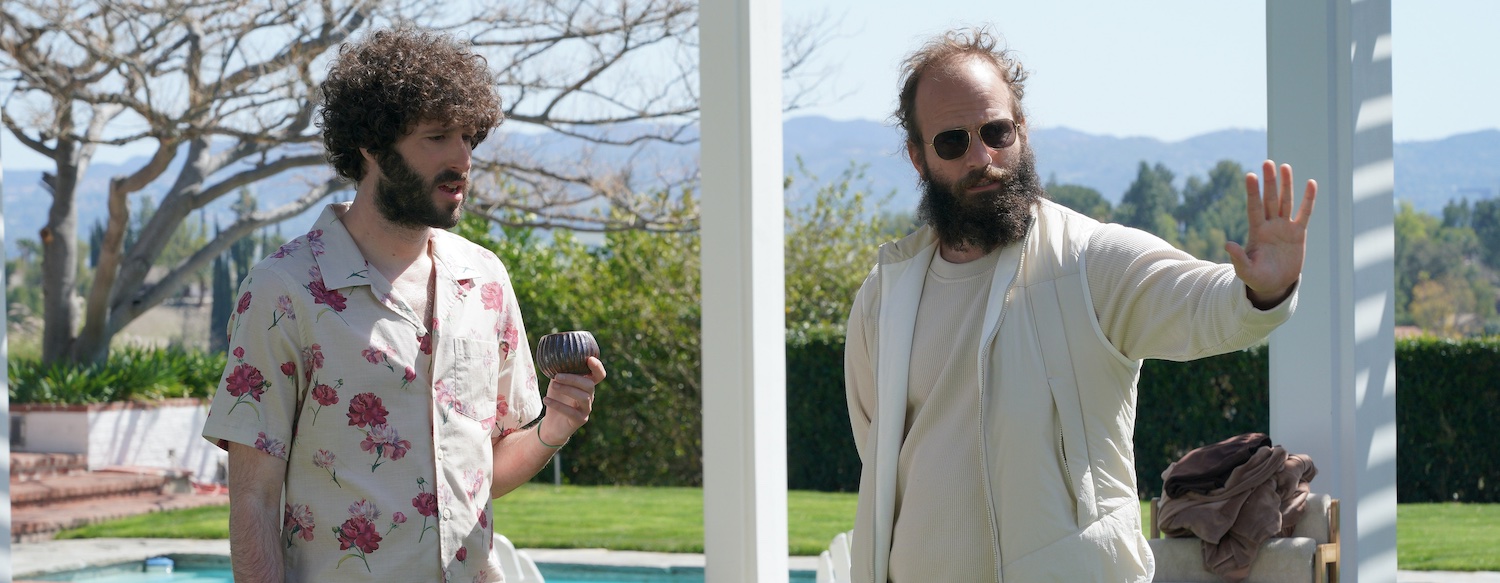What to Watch Verdict
After keeping viewers in suspense all season, the hidden-in-plain-sight revelation Dave makes about his creative process proves remarkably effective.
Pros
- +
🎤 Using Rick Rubin as both an industry luminary and an enigmatic legend creates a perfect path to Lil Dicky's personal epiphanies.
- +
🎤 "Dream sequence" episodes can be hit or miss but the writers psychologically seed everything beautifully.
Cons
- -
🎤 I'm mildly concerned that after nine episodes of creative and professional inertia, the show may let him make too much progress too quickly in the finale.
This post contains spoilers for Dave.
Check out our last review here.
Producer Rick Rubin is a legend. After cofounding Def Jam Records, working with everyone from the Beastie Boys to Johnny Cash to Kanye West, and adopting the persona of a bohemian mystic, he’s become known as well for who he is as what he’s accomplished. (Only he could literally bum around with Paul McCartney, as he does on the Hulu series 3, 2, 1 and it simultaneously feel like a master class in exploring creativity and a casual meeting of two peers.) So when Dave (Dave Burd) shows up at his front door — or perhaps more accurately, at the front door of some immaculate, serene facility where he allegedly works, it’s the struggling rapper’s greatest opportunity to turn around his creative inertia. But that also means that Dave has to give in to Rick’s mysterious methods, and take a closer look at his own.
First, however, he has to meet him. Instead of Rubin, however, Dave meets Biff Wiff, an actor experiencing a fairly extraordinary career renaissance at this exact moment thank to both his appearance here and as Santa Claus in Season 2 of I Think You Should Leave. Additionally, he’s greeted by Adams (Ben Sinclair), an intermediary who attempts to open up Dave’s mind to the more existential obstacles he faces to getting back his writer’s block. Predictably, Dave uses humor to deflect Adams’ efforts to probe him, but he remains unsettled by a bearded eccentric working for the bearded eccentric he’s there to work with. “I think we’ve made great progress,” says Adams. “I think tomorrow is the day.”
Dave also a homework assignment: To write down his greatest fears and bury the paper somewhere on the property. After scribbling down some more mundane anxieties, he writes “Failure.” But then he marks through the word and replaces it with “Success” before going into the backyard to bury it at the foot of a tree. The next morning, Adams brings Dave to a flotation tank. “Your ego is trying to protect itself. But great work requires something more vulnerable,” observes Adams. Dave resists, objecting to anything even “spiritual-adjacent,” but Adams points out that he can’t get through ten seconds of silence. But shortly after he gets into the tank, he awakens and decides to go for a walk.
Dave soon finds himself in a nightmarish landscape where initially he’s a chef; GaTa coaxes him through the meal service with typical positivity, while Mike (Andrew Santino) barks orders at him, and Elz (Travis “Taco” Bennett) focuses on his own dishes. What he eventually prepares gets served to his childhood friends, who after dismissing the dishes demand more. Across the restaurant, Emma (Christine Ko) films him, before he approaches his mother — who turns into Ally (Taylor Misiak) — to apologize for the failure of their relationship. But after fleeing towards to blinding light of an opening door, he encounters the person he was meant to connect with: himself.
Confronted by a semi-hairless version of himself, Dave listens as this alter ego plays not one but two absolute bangers featuring razor-sharp vocals. What’s interesting is the way that Dave still doesn’t get it. “Can I have those?” he asks himself. But after questioning if the lesson of this exercise is to simply be himself, or even more frighteningly, to become a better person, his doppleganger suggests, “how is that going to help you make better music?” And so, the artist who overthinks everything finally discovers what he never bothered to consider: maybe stop doing that. “Just harness,” Dave says to himself.
Suffice it to say that it’s never quite so easy to overcome anxieties and learned behaviors in real life as it is on television, even with the support and guidance of Rick Rubin. But the episode is an important reminder that so many of the things that get in the way of the goals we set for ourselves exist exclusively in our heads, and at one time or another we all need to have a conversation with ourselves — or at least a long look in a mirror — to confront what we’re doing, and often not doing. It will be extremely interesting to see how this leads Dave forward, not just into next week’s finale but in subsequent seasons where he may repair at least some of the damage his procrastination and overthinking has caused.
The latest updates, reviews and unmissable series to watch and more!
Too much time has passed with nothing for it to solve all of his problems, both the immediate ones around his creativity but also the larger issues connected to his career; but if nothing else “Dave Enlightened” is a welcome reminder — to both him and us — that one of the reasons we started watching him in the first place is that he’s a great rapper.
Todd Gilchrist is a Los Angeles-based film critic and entertainment journalist with more than 20 years’ experience for dozens of print and online outlets, including Variety, The Hollywood Reporter, Entertainment Weekly and Fangoria. An obsessive soundtrack collector, sneaker aficionado and member of the Los Angeles Film Critics Association, Todd currently lives in Silverlake, California with his amazing wife Julie, two cats Beatrix and Biscuit, and several thousand books, vinyl records and Blu-rays.


